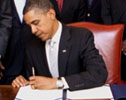
President Obama’s strategy to help stop violence perpetrated by the Lord’s Resistance Army, or LRA, provides a broad blueprint for action. For that blueprint to become a legitimate path to peace, the administration must take immediate steps to put it into action. We’re partnering with our friends at Resolve to outline six steps the administration should take to kick-start implementation of the strategy (click here to see our post on Step 1). Ultimately, the success of the strategy will be judged by whether it actually keeps people in central Africa safe from LRA attacks, but by taking these six steps President Obama can demonstrate he’s serious about achieving that goal.
Item 2: Task a Great Lakes special envoy with implementing the strategy
The task of promoting peace within the region affected by LRA violence is complex. Over the last 20 years the LRA has been active in the remote regions of four different countries – Congo, Central African Republic, Sudan, and Uganda. LRA attacks have targeted isolated, marginalized communities that these national governments have shown little interest in protecting. A history of bloody conflict within and between these countries has further diverted attention away from the LRA and impeded regional collaboration to address the crisis.
President Obama needs a team that can navigate complex regional politics and formulate an effective response to a conflict infamous for spilling across borders. However, responsibility for the LRA crisis in currently dispersed in a maze of different offices within the State Department, National Security Council, Department of Defense, and USAID, not to mention different U.S. embassies in central Africa. As a result, the LRA – and the communities it targets – often get lost in the bureaucratic shuffle.
President Obama must move beyond this status quo if his LRA strategy is to have any success. His first step should be to task a Great Lakes special envoy with coordinating and pushing forward implementation of his LRA strategy. Such a diplomat should have a mandate to address insecurity in the broader Great Lakes region and travel frequently to the region. This envoy should also have several full-time staffers, including some dedicated specifically to the LRA crisis. The work of this diplomat should be strengthened by regular meetings between foreign policy officials across different U.S. government agencies at both the working staff level and the more senior Deputies Committee or Principals Committee level.
We’ve read that President Obama intends to increase his engagement with Africa this year. We hope one step in that process includes tasking a Great Lakes special envoy with implementing the administration’s LRA strategy.
Photo: President Obama signs LRA strategy (Courtesy of the White House)

